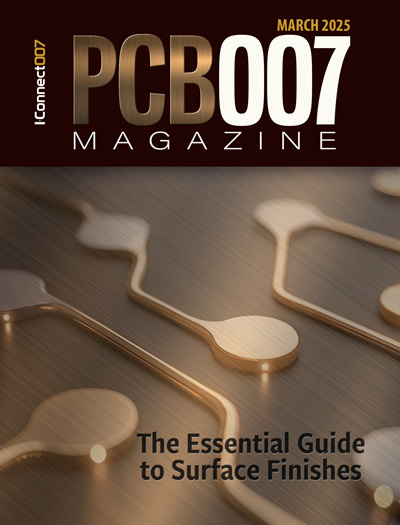-

- News
- Books
Featured Books
- pcb007 Magazine
Latest Issues
Current Issue
In Pursuit of Perfection: Defect Reduction
For bare PCB board fabrication, defect reduction is a critical aspect of a company's bottom line profitability. In this issue, we examine how imaging, etching, and plating processes can provide information and insight into reducing defects and increasing yields.

Voices of the Industry
We take the pulse of the PCB industry by sharing insights from leading fabricators and suppliers in this month's issue. We've gathered their thoughts on the new U.S. administration, spending, the war in Ukraine, and their most pressing needs. It’s an eye-opening and enlightening look behind the curtain.

The Essential Guide to Surface Finishes
We go back to basics this month with a recount of a little history, and look forward to addressing the many challenges that high density, high frequency, adhesion, SI, and corrosion concerns for harsh environments bring to the fore. We compare and contrast surface finishes by type and application, take a hard look at the many iterations of gold plating, and address palladium as a surface finish.
- Articles
- Columns
Search Console
- Links
- Media kit
||| MENU - pcb007 Magazine
A Smarter Habitat for Deep Space Exploration
September 25, 2019 | Carnegie Mellon UniversityEstimated reading time: 2 minutes
In order to explore the Moon or Mars, astronauts need smart habitats that will support life and remain operational when they are vacant. To advance the design of autonomous systems for space habitats, NASA is funding a multi-university Space Technology Research Institute called Habitats Optimized for Missions of Exploration, or more fittingly, HOME.
Mario Bergés, associate professor of civil and environmental engineering (CEE), is leading the Carnegie Mellon University research team working under the auspices of HOME. Their task is to enable complete situational awareness in the habitat by providing it with capabilities to process and interpret its own data and make decision recommendations that can be passed on to robotic systems or suggested to human occupants.
"Space is harsh and errors can be catastrophic, so we need autonomous systems that are very good," Bergés said. One idea the team is exploring is the application of artificial intelligence to analyze equipment data to understand electricity use in the habitat. By knowing how power is consumed, then the status of all the electric-powered systems in the habitat could be monitored.
Scientists have experience conducting data analysis for equipment on Earth, but Bergés said we have to learn how to translate this knowledge to the context of space and specifically to the systems in these habitats.
For example, on Earth there are a variety of air-conditioning systems and we where potential faults are and how they happen can be determined. But in the new habitats, all the systems will be one-offs.
"How do you conduct automated fault detection and diagnosis without a lot of system data? This is where AI comes in," Bergés said. "We have machines that learn by themselves if you give them enough data, but we don't have a lot of machines that can reason by using existing engineering knowledge, which can reduce the amount of data they need."
To rein in the amount of data needed to detect equipment faults throughout the habitat, the team will collect electrical measurements. This data will be shared with robotic systems that will process it and act on the physical environment, and, in theory, enable the habitat to maintain itself.
The CMU team is comprised of Bergés, an expert in sensing and data analysis for infrastructure; Burcu Akinci, a CEE professor and expert in information modeling; and Stephen Smith and Artur Dubrawski from CMU's Robotics Institute, who will lead research on machine learning and robotic systems. CMU's research will feed into other projects underway in the institute.
HOME is funded for five years for approximately $15 million, and NASA may apply recommendations spinning out from the institute before the funding period ends. According to Bergés, CMU's research could potentially inform the design of a gateway station that will orbit the Moon as part of NASA's deep-space exploration plans.
Bergés believes that civil engineers will play a role in space exploration.
"Since the beginning, civil engineers have been the stewards of the infrastructure that supports modern life," he said. "If humanity is moving into space, it makes sense for civil engineers to be part of that."
Suggested Items
Mesa West, Advanced West Announce Strategic Partnership
06/15/2025 | Mesa WestMesa West is proud to announce that they have officially joined forces with Advanced West. This strategic partnership brings together two industry leaders, uniting strengths to better serve customers through enhanced capabilities, expanded offerings, and continued commitment to quality.
Evolve Manufacturing Celebrates 100 Years of Combined Leadership in Medical Device Manufacturing
05/26/2025 | Evolve ManufacturingEvolve Manufacturing Inc., a leading provider of end-to-end contract manufacturing services for medical device and life sciences instrument companies, proudly celebrates 100 years of combined medical device leadership among its expert team.
LitePoint, Pegatron 5G Successfully Launch Volume Manufacturing of 5G O-RAN Radio Units to Power Private 5G Networks
05/21/2025 | BUSINESS WIRELitePoint, a leading provider of wireless test solutions, and Pegatron 5G, a leading provider of end-to-end 5G product solutions, have jointly announced a milestone in their collaboration; the start of high-volume manufacturing for 5G O-RAN radio units.
SEMI Reports Typical Q1 2025 Semiconductor Seasonality with Potential for Atypical Shifts Due to Tariff Uncertainty
05/19/2025 | SEMIAccording to the Q1 2025 Semiconductor Manufacturing Monitor (SMM) Report released by SEMI in collaboration with TechInsights, the global semiconductor manufacturing industry entered 2025 with typical seasonal patterns.
EV Group Forms Subsidiary in Singapore to Strengthen Local Customer Support
05/19/2025 | PRNewswireEV Group (EVG), a leading provider of innovative process solutions and expertise serving leading-edge and future semiconductor designs and chip integration schemes, announced that it has formed a fully owned subsidiary in Singapore.


